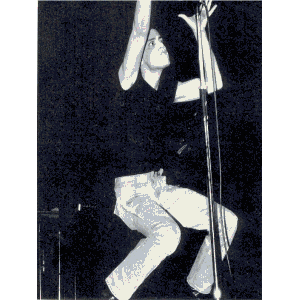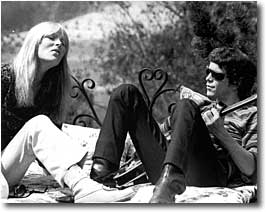 Few rock groups can claim to have broken so much new territory, and maintain
such a constant brilliance in a record as the Velvet Underground during
their brief lifespan. The sixties was an era of explosive growth and experimentation
in rock but The Velvets contribution were to abrasive for the mainstream
to handle. During their time, the groups experienced little commercial
success, but were extremely appreciated by a cult audience and some critics.
The larger public treated them with indifference and occasionally scorn.
By the 1980's they were acknowledged not just as one of the most important
rock bands of the late 1960's, but one of the best of all time.
Few rock groups can claim to have broken so much new territory, and maintain
such a constant brilliance in a record as the Velvet Underground during
their brief lifespan. The sixties was an era of explosive growth and experimentation
in rock but The Velvets contribution were to abrasive for the mainstream
to handle. During their time, the groups experienced little commercial
success, but were extremely appreciated by a cult audience and some critics.
The larger public treated them with indifference and occasionally scorn.
By the 1980's they were acknowledged not just as one of the most important
rock bands of the late 1960's, but one of the best of all time.
The leader, singer, and songwriter Lou Reed loved rock n' roll from an early age. By the early 60's he was getting into avant-garde jazz and serious poetry while studying at Syracuse University. After graduation, he began churning out tunes for rock albums as a staff songwriter for Pickwick records in New York City. While working there he met John Cale, a Welshman who had moved to New York to study and perform "serious" rock music. Reed and Cale were both interested in fusing their two interests, avant-garde and pop, and had found their ideal partners in creating their dream.
Reed and Calle realized they would need a full band in order to really produce what they wanted. By 1965, they had recruited two more members, guitarist Sterling Morrison and drummer Angus MacLise to make a quartet called the Velvet Underground. MacLise quit before the band could play their first gig claiming that the band were sellouts because they were accepting money for art. The Velvets quickly recruited drummer Maureen Tucker, a sister of Morrison's friends.
Even at this point the Velvets were on they're way to developing something extremely different. Their original material, sung by Reed, dealt with hard urban realities of Manhattan, describing drug use, and sadomasochism. It was a controversial blend to say the least, but the Velvets got and unexpected benefactor when artist and pop-art icon Andy Warhol caught the band at a club in late 1965. Warhol quickly assumed management of the band and produced their debut album in spring of 1966.

The albums release was not without complications. First, it wasn't released until a year after it was finished. Andy Warhol had assured then of high media profile, but the music was simply too radical to fit into commercial radio. "Underground" rock radio had barely gotten started at this point, and in any case they may have been over looked because psychedelic music was approaching its peak. They album only reached 171 in the charts, and that's as high as any of their albums would get in their original release.
A cult reputation was not enough to secure a stable livelihood for the band in the 60's. Amidst their tense atmosphere, the second album, White Light/White Heat, was recorded in late 1967.
By summer of 1968 the band had a much graver problem on their hands then commercial success (or lack of it). A rift developed between Reed and Cale, the two most creative forces in the band. Reed gave an ultimatum, saying he would leave the band unless Cale was fired. Morrison and Tucker sided with Reed, and Doug Yale was recruited to take Cale's place.
Even in the absence of Cale, the band still was capable of generating compelling and intense music. The beginning of the 1970's seemed to hold a considerable promise for the group, as they signed to Atlantic Records. By this point personal problems that had dogged them, finally became overwhelming. By the summer of 1970, Reed quit the group and moved back to his Long Island home, several months before launching a solo career, and just before the releases of Loaded, his final studio album with the Velvets. With Reed, and Cale developing solo careers, and such important figures as David Bowie, Brian Eno, and Patti Smith giving great recognition to the band, the Velvet Underground became more and more popular as the years passed. In the 1980's original albums were reissued, along with a couple of important collections of outtakes, and with growing popularity and a reunion tour in 1980, the Velvet Underground proved they were surly ahead of their time.
